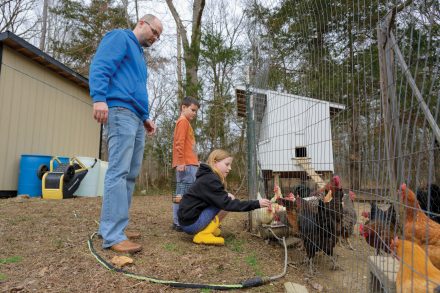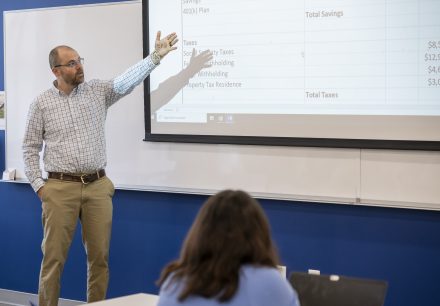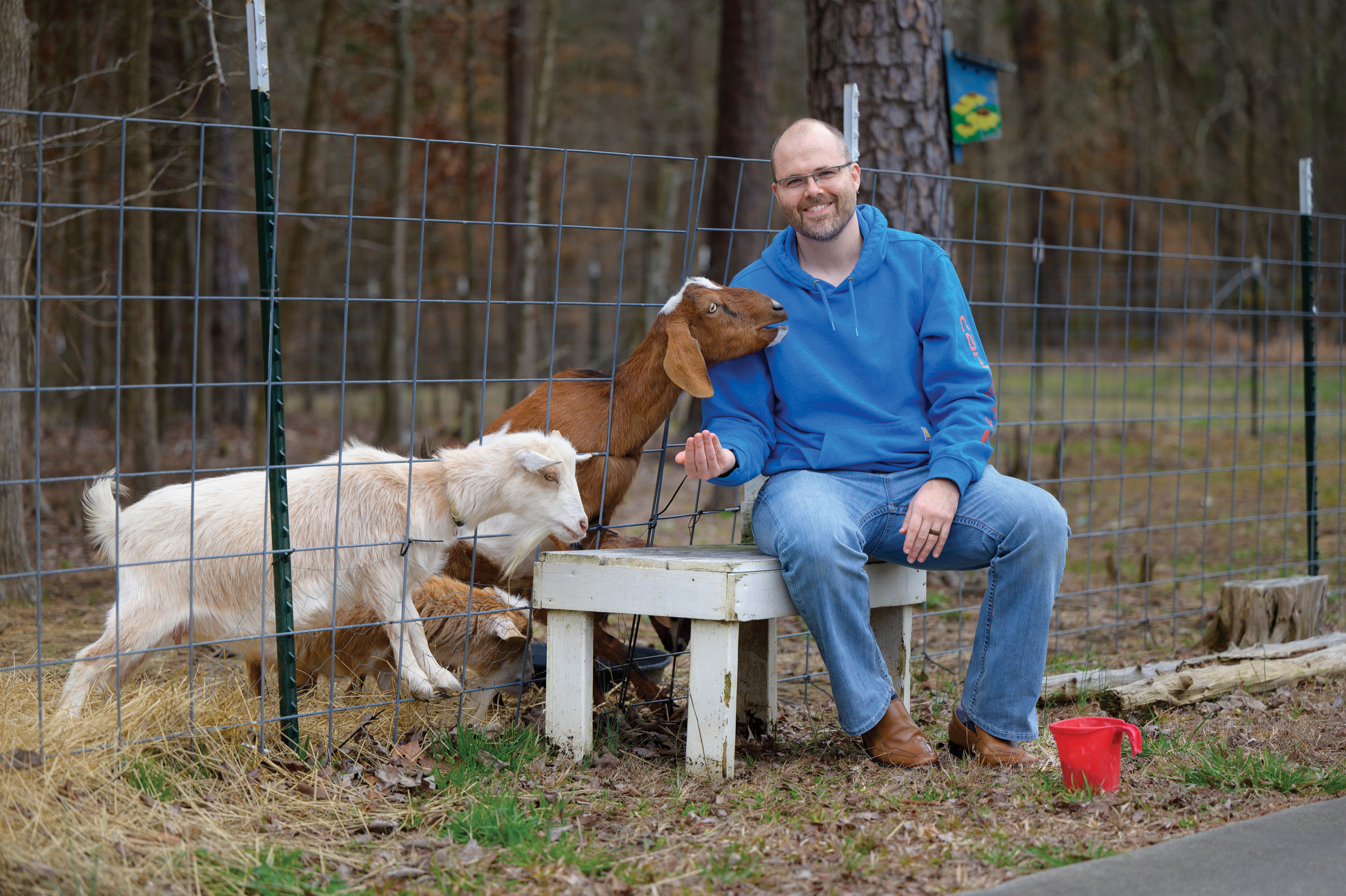Associate Professor of Finance Chris Harris sows seeds for personal finance using an innovative approach.
In the field of personal finance, chris harris emerges as a steadfast cultivator, nurturing individuals on their journey toward financial freedom. As director of Elon University’s Center for Financial Literacy, Harris, an associate professor, has dedicated nearly a decade to providing a relatable approach to teaching the ins and outs of being financially viable, sowing the seeds of financial literacy and discipline.
Tapping into the connections between personal finances, farming and authentic relationships, he emphasizes the commonality of financial challenges among participants in his courses.
Harris’s journey at Elon began with teaching personal finance workshops for the Odyssey Program. As other people began to hear about his work with the Odyssey scholars, the demand for his approach to teaching personal finance grew. This led him to engage with faculty, staff and the larger community. Part of his innovative approach sparked from his commitment to providing information without the usual sales pitch.
“One of the things I recognize is almost everybody who wants to offer insight or answers about finance is trying to sell you something,” says Harris, who also chairs Elon’s Department of Finance. “And it’s hard to find someone who will just tell you, ‘Here’s how the industry works. Here’s what you need to focus on,’ without trying to ask for money.”
But Harris adopts a unique perspective that breaks down the intimidating exterior of finance by making the topic relatable. He achieves this by incorporating personal touches, such as photos from his farm.
“I try to show some pictures of other things in my life, showing what I care about. Everybody there has something else that they care about,” Harris says. “That’s why we even talk about personal finances, because we want to know how to manage what we have for the things that we really care about.”

Harris’ unique perspective is not limited to the classroom but extends to his life as a farmer. Drawing parallels between managing a farm and personal finance, he highlights the importance of perseverance, sacrifice, consistency and recognizing that positive changes take time. He and his wife wanted to own a farm to teach their children how to work hard and make sacrifices.
Like a farmer who carefully cultivates crops and nurtures them to fruition, individuals must sow the seeds that will enhance their personal finances with diligence and care. Just as a farmer must adapt to changing seasons and unforeseen challenges, individuals must navigate financial fluctuations and unexpected expenses, weathering storms and embracing opportunities for growth. Individuals seeking to improve their personal finances may wonder when their hard work will finally yield noticeable results, but perseverance and sticking to one’s goal can yield a bountiful harvest.
“All of us that want to reach financial goals recognize we’re going to have to make some sacrifices,” Harris says.
Acknowledging this commonality, he helps individuals identify their personal connection to the importance of financial literacy and fosters a sense of community among participants. “We’re going to have to work hard and be consistent so that eventually we can harvest what we’ve been working for,” he says.
***
The impact of these lessons and Harris’ innovative approach have allowed him to become a guiding light to those who are tending their financial fields. Among many memorable experiences involving his students, Harris shared how one student used what he learned to negotiate a car purchase. Harris says the negotiation process is similar to a dance, highlighting dealerships’ systematic approach and emphasizing the importance of understanding their tactics.
In a heartfelt card, the student proudly shared that, following Harris’ guidance, they saved $3,500 on the purchase of their car. While the duration of the negotiation may have exceeded the professor’s suggested time frame, the sense of accomplishment and financial empowerment prevailed. “It was fun to get a card from a student and find out that he successfully negotiated buying a car. It shouldn’t have taken him that long, but he got the car,” Harris says. “But I get a lot of cards and letters like that that are a lot of fun.”

Similar success stories reflect the tangible impact of Harris’ approach, as individuals apply the lessons learned from his classes and workshops to real-world scenarios. These anecdotes further underscore his commitment to teaching and empowering individuals to navigate the fertile grounds of personal finance successfully, nurturing them to become diligent stewards of their finances.
Harris’ distinct approach to personal finance also extends to those in the greater Elon and Alamance County communities, reaching organizations like Elon Academy, Jack and Jill, Boys & Girls Club, Rotary Club and King Academy. Addressing families’ concerns about student loans, Harris has provided guidance on strategies to minimize debt and find effective ways to fund education. The impact of his efforts is evident in the tangible benefits that these families enjoy, as they embark on their academic journeys with improved financial plans and reduced reliance on loans.
“That’s a blessing to their life,” Harris says. “And they weren’t students or employees at Elon. They’re just people who are my neighbors. They live here in Alamance County, the same as me. And so I’ve always appreciated being able to provide finance education to them.”
Ultimately, Harris recognizes financial wellness’ profound impact on overall well-being and aims to contribute to Elon’s HealthEU initiative by providing education to alleviate financial stress. “According to the American Psychology Association, finances are a leading source of stress for Americans. When you feel that level of stress, it impacts your thoughts, sleep, health and relationships,” Harris says. “But when people feel that they have a plan and understand their finances better, they feel better. And that’s a real thing. It’s not just that their finances are better, but they feel better. We want people to feel healthier and happier.”
Looking ahead, Harris envisions leveraging technology to reach a broader audience. With the assistance of a student advisory board, he plans to create videos and establish a peer mentoring program, ensuring the Center for Financial Literacy continues to evolve and cater to diverse audiences.
“We’re trying to find ways that we can reach more people where they are, in a way that people will respond to,” Harris says. “I believe in engaging people who know the audience really well, which are the students. Having the students be more involved in reaching students will be extremely beneficial.”



